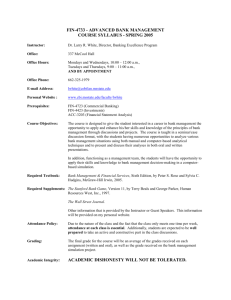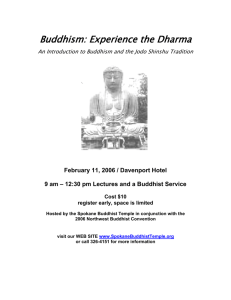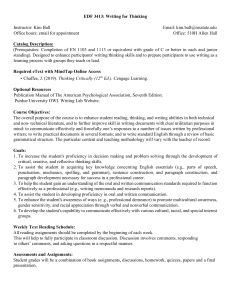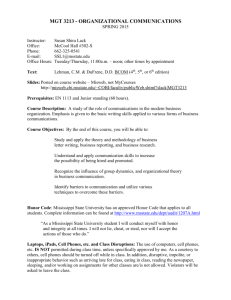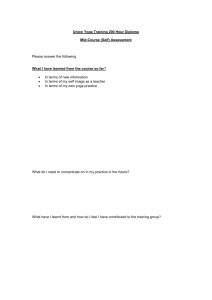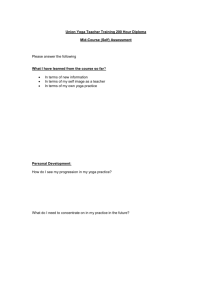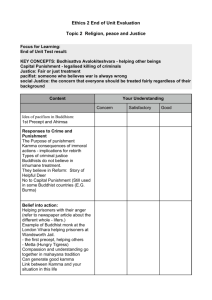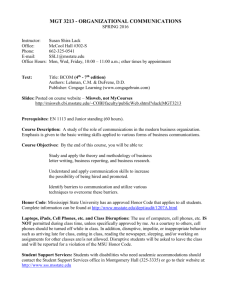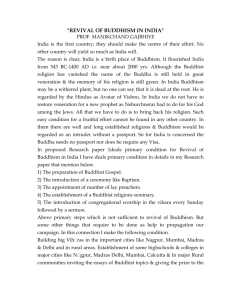Hinduism and Buddhism by Jonathan Edelmann
advertisement
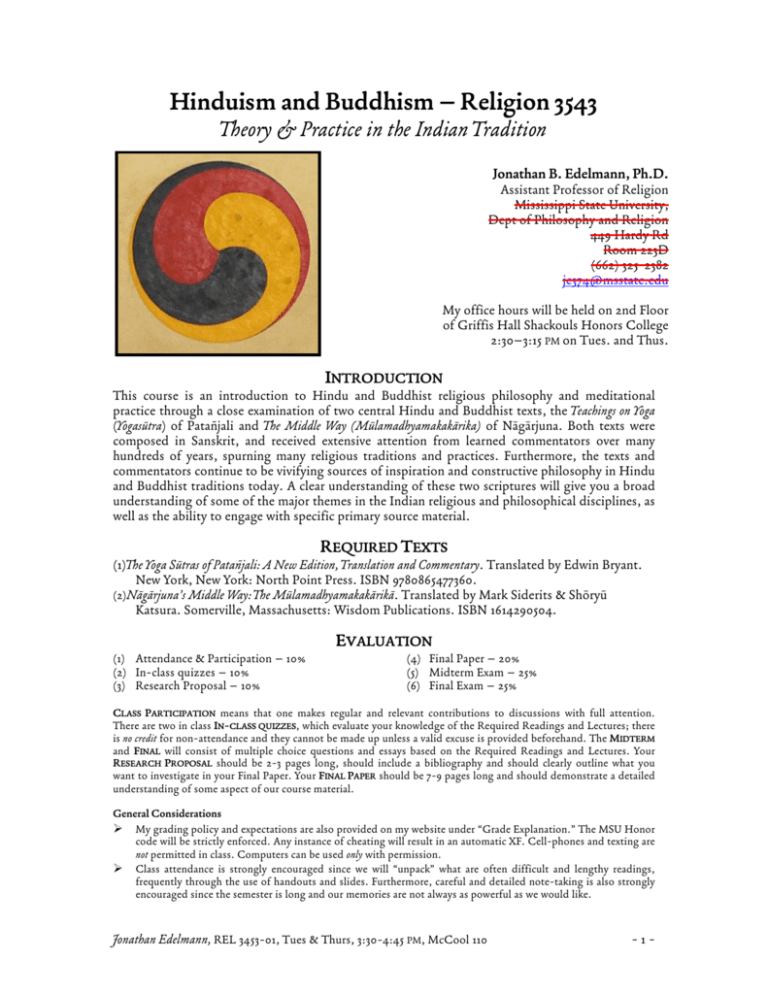
Hinduism and Buddhism – Religion 3543 Theory & Practice in the Indian Tradition Jonathan B. Edelmann, Ph.D. Assistant Professor of Religion Mississippi State University, Dept of Philosophy and Religion 449 Hardy Rd Room 223D (662) 325-2382 je374@msstate.edu My office hours will be held on 2nd Floor of Griffis Hall Shackouls Honors College 2:30–3:15 PM on Tues. and Thus. INTRODUCTION This course is an introduction to Hindu and Buddhist religious philosophy and meditational practice through a close examination of two central Hindu and Buddhist texts, the Teachings on Yoga (Yogasūtra) of Patañjali and The Middle Way (Mūlamadhyamakakārika) of Nāgārjuna. Both texts were composed in Sanskrit, and received extensive attention from learned commentators over many hundreds of years, spurning many religious traditions and practices. Furthermore, the texts and commentators continue to be vivifying sources of inspiration and constructive philosophy in Hindu and Buddhist traditions today. A clear understanding of these two scriptures will give you a broad understanding of some of the major themes in the Indian religious and philosophical disciplines, as well as the ability to engage with specific primary source material. REQUIRED TEXTS (1)The Yoga Sūtras of Patañjali: A New Edition, Translation and Commentary. Translated by Edwin Bryant. New York, New York: North Point Press. ISBN 9780865477360. (2)Nāgārjuna’s Middle Way: The Mūlamadhyamakakārikā. Translated by Mark Siderits & Shōryū Katsura. Somerville, Massachusetts: Wisdom Publications. ISBN 1614290504. EVALUATION (1) Attendance & Participation – 10% (2) In-class quizzes – 10% (3) Research Proposal – 10% (4) Final Paper – 20% (5) Midterm Exam – 25% (6) Final Exam – 25% CLASS PARTICIPATION means that one makes regular and relevant contributions to discussions with full attention. There are two in class IN-CLASS QUIZZES, which evaluate your knowledge of the Required Readings and Lectures; there is no credit for non-attendance and they cannot be made up unless a valid excuse is provided beforehand. The MIDTERM and FINAL will consist of multiple choice questions and essays based on the Required Readings and Lectures. Your RESEARCH PROPOSAL should be 2-3 pages long, should include a bibliography and should clearly outline what you want to investigate in your Final Paper. Your FINAL PAPER should be 7-9 pages long and should demonstrate a detailed understanding of some aspect of our course material. General Considerations My grading policy and expectations are also provided on my website under “Grade Explanation.” The MSU Honor code will be strictly enforced. Any instance of cheating will result in an automatic XF. Cell-phones and texting are not permitted in class. Computers can be used only with permission. Class attendance is strongly encouraged since we will “unpack” what are often difficult and lengthy readings, frequently through the use of handouts and slides. Furthermore, careful and detailed note-taking is also strongly encouraged since the semester is long and our memories are not always as powerful as we would like. Jonathan Edelmann, REL 3453-01, Tues & Thurs, 3:30-4:45 PM, McCool 110 - 1 - I will never be offended or surprised if you wish to ask a question in class. I enjoy questions, even of a challenging nature. Feel free to interrupt me at any time! I will never think your question obvious or think less of you for having asked it. The class time is your time, so use it in your advantage. I only answer emails Monday to Friday between the hours of 8:00 AM to 5:00 PM, but you are welcome to email me at any time. However, in your email, please identify yourself, your class and your class time, and address me by my name, use complete sentences and avoid text-language. Please also consult the syllabus and other relevant material before emailing me to see if your question is answered therein. I will reserve the right not to answer emails that neglect any of the above. Student Honor Code Student Services Databases J Edelmann’s Website RESOURCES http://www.honorcode.msstate.edu/ http://www.sss.msstate.edu/ http://library.msstate.edu/DatabasePortal/subject.asp?id=19 http://www.philosophyandreligion.msstate.edu/faculty/edelmann.php TENTATIVE WEEKLY LECTURES AND READINGS 1 2 3 Introduction to Course Introducing Hinduism and Buddhism Yogasūtra, Introduction by Edwin Bryant The Self When it Abides in its True Nature Yogasūtra, I.1-I.4 Philosophy of Mind and Mental Control Yogasūtra – I.5-I.16; IV.22-IV.26 4 Samādhi and Yogic Theology Yogasūtra – I.17-I.29; I.50-I.51 Research Proposal Due 5 Kriya-yoga, Karma, Suffering, the Seer and Seen, and Liberation Yogasūtra – II.1-II.19 Quiz #1 6 The Eight-fold Yoga and Liberation (kaivalya) Yogasūtra – II.28-II.34; II.46II.55; III.1-III.3 7 Paranormal Powers and Ultimate Liberation (kaivalya) Yogasūtra – III.16-III.55; IV.29IV.34 8 Midterm Exam and Catch Up 9 Spring Break 10 Abhidharma and Madhyamaka Buddhism, and the Four Noble Truths Mūlamadhyamakakārikā – Intro by Siderits & Katsura; Dedicatory Verse; and Ch 24 11 Why There is no Essential Self (anātman) Mūlamadhyamakakārikā – Ch 4 & Ch 18 12 Nāgārjuna’s Conception of the Buddha (the Tathāgata) Mūlamadhyamakakārikā – Ch 16 & Ch 22 Quiz #2 13 Anlysis of Suffering and the False Conception Mūlamadhyamakakārikā – Ch 6 & 23 14 Nirvāna and the Twelvefold Chain Mūlamadhyamakakārikā – Chs 2526 15 Analysis of View Mūlamadhyamakakārikā – Ch 27 Final Papers Due 16 Catch Up and Review for Final Exam Final Exam: Weds, May 7, 3-6 PM Jonathan Edelmann, REL 3453-01, Tues & Thurs, 3:30-4:45 PM, McCool 110 - 2 -
